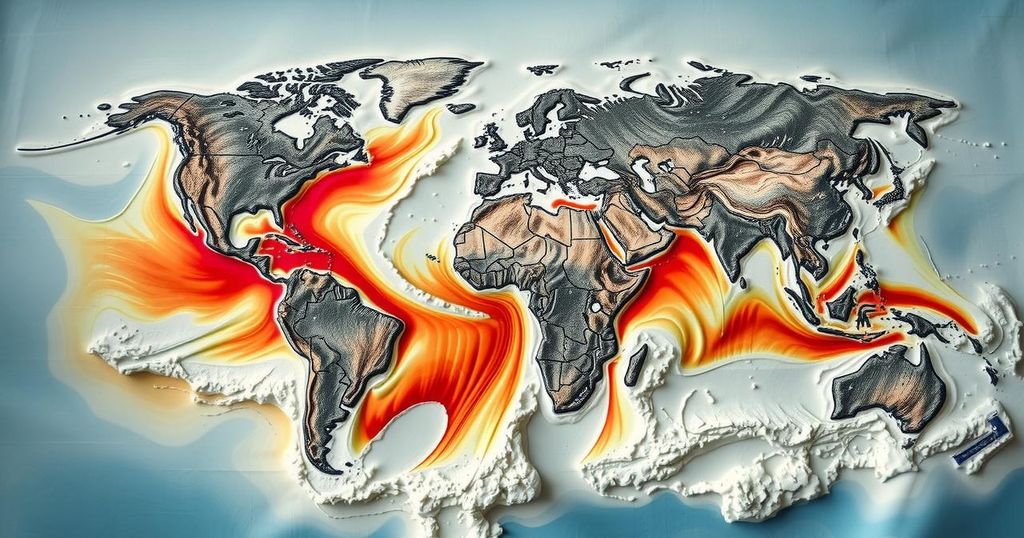Climate change
AUSTRALIA, BRAZIL, CE, CLIMATE, CLIMATE CHANGE, COLORADO, COLORADO STATE UNIVERSITY, CUBA, FIJI, GEOLOGY, GLOBAL WARMING, NATURAL DISASTERS, NORTH AMERICA, OCEANIA, PACIFIC, PACIFIC OCEAN, PACIFIC RING OF FIRE, PORT VILA, RALPH REGENVANU, SANGRE DE CRISTO, SANGRE DE CRISTO MOUNTAINS, SOUTH AMERICA, SOUTH PACIFIC OCEAN, UNITED NATIONS, VANUATU
Leila Ramsay
0 Comments
Is Climate Change Increasing the Frequency of Earthquakes? Insights from Recent Research
Recent studies suggest a link between climate change and increased seismic activity, highlighted by a magnitude 7.3 earthquake in Vanuatu. Research from Colorado State University indicates that as glaciers melt, fault movements may increase, correlating climate change with higher earthquake frequencies. Understanding this relationship is essential for improved disaster readiness and risk mitigation strategies.
A recent study indicates a possible link between climate change and increased seismic activity, particularly reflecting on the devastating earthquake that struck Vanuatu with a magnitude of 7.3. Damage was substantial in the capital, Port Vila, leading to confirmed fatalities and numerous injuries. While Vanuatu is situated within the Pacific Ring of Fire, which inherently predisposes it to earthquakes, researchers are beginning to consider how climate change may intensify these occurrences. The findings from Colorado State University highlight that as glaciers melt due to global warming, fault movements may increase, suggesting a significant connection between climatic shifts and tectonic behavior.
The research focused on the Sangre de Cristo Mountains in southern Colorado, revealing that the melting of glaciers, which once weighed down fault lines, has corresponded with a fivefold increase in movement along these faults since the ice age. This correlation suggests that diminishing ice and fluctuating water pressures may contribute to heightened seismic activity in tectonically active regions. According to Cece Hurtado, the lead researcher, the rapid pace of climate change—much swifter than previous geological records—may pose an increasing risk for earthquake-prone areas.
Further validation came from Sean Gallen, a geosciences professor at the university, who emphasized that understanding the relationship between climate change and earthquakes is crucial for effective hazard assessment and disaster preparedness. The study underscores a growing acknowledgment within the scientific community that atmospheric changes can have profound implications on Earth’s geophysical phenomena.
In summary, the research points to an alarming trend where melting glaciers due to climate change may not only reshape landscapes but also increase the frequency of earthquakes. This insight calls for further inquiry into the interactions between climate and tectonic activity to develop informed strategies for risk mitigation in vulnerable regions like Vanuatu.
The relationship between climate change and seismic activity has emerged as an important area of research, particularly as extreme weather and changing environmental conditions become more prevalent. Regions like Vanuatu, situated within the Pacific Ring of Fire, experience regular seismic activity, raising concerns that climate change could amplify these natural occurrences. The recent earthquake in Vanuatu, which caused significant destruction, has highlighted the urgency of examining how global warming and glacial melting could influence geophysical processes, prompting a need for scientific investigation into these interactions.
In conclusion, emerging research indicates that climate change may significantly influence seismic activity, particularly through the melting of glaciers that previously exerted pressure on geological faults. The notable increase in earthquake frequency in regions undergoing climatic shifts suggests an urgent need for further investigations to understand these dynamics. This understanding could enhance preparedness and inform policies to mitigate the impacts of earthquakes exacerbated by climate change.
Original Source: www.euronews.com




Post Comment